
By Taylor Yates and Paul Joy
Belmont has zoned itself into a financial corner. Fiscally healthy towns balance their tax bases between commercial and residential real estate, Belmont does not. Belmont receives only 5% of its property tax revenue from commercial real estate, whereas fiscally strong towns receive 20% or more. We receive so little revenue from commercial real estate because the few areas in town where it is allowed suffer from overly burdensome regulation.
The Economic Development Committee and Vision 21 Implementation Committee were charged by the Select Board to review Belmont’s zoning bylaws and to look for ways in which they could be reformed to improve our commercial districts. After reviewing several areas of improvement and working with a Massachusetts zoning consultant, the town planner, and Town Council, the committees have put forth two zoning bylaw amendments. We anticipate the Select Board will sponsor the amendments at November’s Special Town Meeting.
Commercial real estate is important
Why is commercial real estate so important? From the town’s perspective, commercial real estate is more profitable because it can generate the same or more revenue per acre and consumes relatively little in terms of town services, especially educational spending.
Consider the following example where, according to the Assessor’s Office, the median tax on a home in Belmont is $16,450, whereas, according to the Massachusetts Department of Education, Belmont spends $15,279 per pupil. So a median home with just one child in the school district generates only $1,200 for the town, and doesn’t include the cost of other town services and additional children in the school system. Commercial real estate does not put kids in schools, which makes it very helpful in offsetting the cost of residents.
Town finances are more complicated than this simple example, but these fundamental economics are inescapable. We either need to make big cuts to the town’s budget, grow our commercial tax base, or continue to pass tax overrides.
Many Belmontians support investment in our commercial tax base because it can improve the quality of life in town. Restaurants are an excellent example of this. Filling empty storefronts with new restaurants improves town finances, supports our local business owners, improves our streetscapes, and provides dining options for our residents.
Several of the zoning bylaws regulating restaurants are onerous, outdated, and time consuming for the boards, committees, and town departments that are responsible for a highly detailed review. Not only that, our existing zoning bylaws favor chain restaurants because navigating our complex process requires deep pockets.
Changes are being proposed for the town’s definitions of restaurants, its special permit requirements, and its parking mandate. The goals are to streamline processes, modernize regulations, and foster a more diverse, inclusive, and business-friendly environment while preserving Belmont’s historic, small-town character.
The Economic Development Committee and Vision 21 Implementation Committee have spent the better part of 2023 investigating zoning reforms and have proposed two restaurant-focused zoning bylaw amendments (available on the Vision21 website) that will do three things:
- Make it easier to open a restaurant in town by allowing restaurants by right in all business districts
- Close the existing chain restaurant loophole by creating a special category for “food service establishments, formula based” that requires a special permit and dictates guidelines for receiving one
- Bring the town’s restaurant parking requirements in line with surrounding towns
It is important to note that these amendments will not change the following:
- They will not remove restaurant regulations. Restaurants have to obey applicable laws, just like everyone else.
- They will not affect bylaws regarding new construction and renovations. Those bylaws will remain in place.
- These changes will not solve all the town’s financial problems, but they are an important and thoughtful step in the right direction.
We ask for the support of Town Meeting members and the public as the need for these changes is great. The committees will continue to address business zoning bylaws to ensure alignment and competitiveness with our surrounding communities and pave the way for many more businesses to open and thrive.
Taylor Yates is chair of the Vision21 Implementation Committee, a member of the Planning Board, and a Town Meeting member from Precinct 2. Paul Joy is chair of the Economic Development Committee, a member of the MBTA Multifamily Community Advisory Committee, and a Town Meeting member from Precinct 7.



Sorry, the comment form is closed at this time.